Photos by Weenta Girmay, owner and co-director at Weenta Productions. She has a sincere love for people and their stories, which is what inspires her to keep making new media. Her personal work can be found at weenta.com.
The Gulf Coast of the United States faces some of the most dramatic climate impacts on the entire planet. Southeast Louisiana loses a football field worth of land every hour due to the heavy amount of fossil fuel extraction taking place there.1 But it’s not just sea-level rise making an impact on the communities that call the Gulf home — the entire infrastructure of the fossil fuel economy, from pipelines to petrochemical plants, has been affecting the health and livelihoods of Gulf residents for generations.
But coastal communities aren’t backing down from the oil and gas industry any time soon. Residents have been naming the problem of fossil fuel extraction for decades, and they have the solutions for their communities. The visionary groundwork is being laid for a more just Gulf by the people who live there.
The Gulf activists and residents featured here share their side of the extraction story — some talk about how fossil fuels have impacted the health of their communities, and others talk about why and how they organize to keep fossil fuels in the ground. Each voice ties together a powerful story of the Gulf’s resistance to fossil fuels.
Another way to stand in solidarity with Gulf Coast communities is to demand that President Obama end all new offshore drilling on our shores. Sign the petition here.
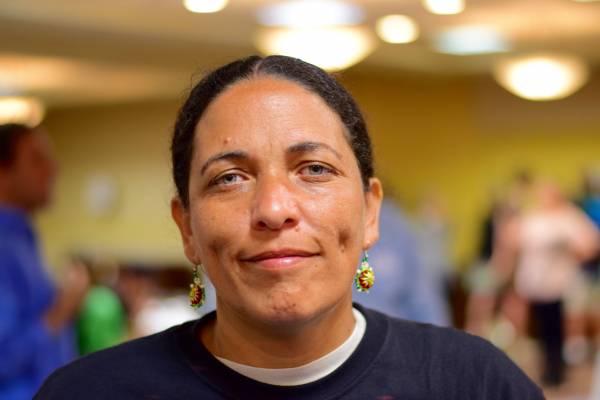
Cherri Foytlin, BOLD Louisiana
I was activated during the BP spill. I remember it like it was yesterday. I jumped on a boat with a fishing family. It was a father and his little boy and we came up on these big globs of oil. I always say it was like a bad movie, like you see the monsters coming slowly but there’s nothing you can do about it. It surrounded the boat, it had taken over all the area around us. We came up on this pelican that was in the water and it was convulsing and having problems. We originally thought we could pull the pelican out–you know they show you on TV, you pull the pelican out and you wash it with Dawn and then everything’s fine, right?
So we were going to take him back to Fort Jackson where at that time they were washing the birds. We didn’t get very far before we realized that this bird was not going to make it, it was dying in front of us. So the fisherman, this big strong Cajun man, he idles down the boat, and him and his little boy and myself, we sat there with the bird until it passed away.
And I’ll never forget the look on his face and the look on that little boy’s face because all he had been talking about the whole time was how he wanted to be a fisherman when he grew up–and I just realized as this 200 some odd pound Cajun man hit his knees just crying like a baby and the little boy was crying because he’d probably never seen his dad cry before—what did I contribute to that? What was my footprint on this earth that contributed to the damages to this very fragile ecosystem? In that moment I realized that it could all be gone like that.
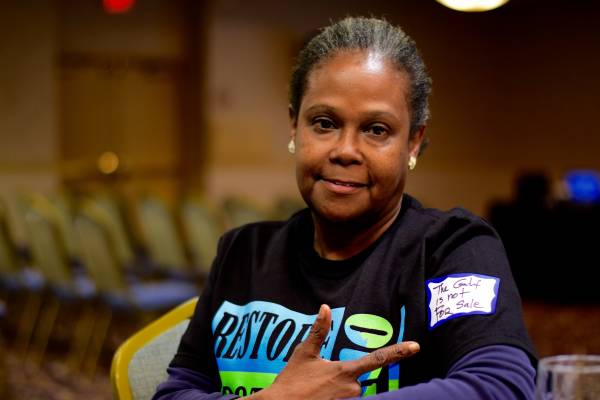
Jackie Antalan, Operation Homecare
Black communities were led to believe that we were irresponsible, that’s why all of these things are happening to us, but now we know it’s not, it’s our environment. It’s what’s been brought into our backyards and our neighborhoods that we didn’t know was there.
You remember how they tried to turn Black Lives matter into Every Lives Matter? Yes, every life matters, but everybody’s subdivision wasn’t built on a chemical dump. Everybody’s subdivision wasn’t built next to a chemical plant. What do most black communities in the gulf coast have in common? They’re connected to some environmental issue that is detrimental to their health.
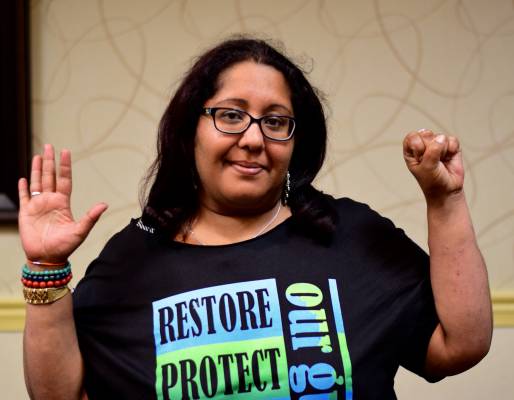
Jayeesha Dutta, Radical Arts & Healing Collective
We are so accustomed to the fight because there’s so much injustice. The image of the fist is so strong with us and what I’ve really been trying to figure out in my own heart, in my own body is how do we have our open hand, how do we have our hands together, how do we embody and embrace not only the fist but also the open hand that allows us to connect to each other, to hold each other.
The idea of love as being central to this movement is one that I do not believe is soft. I actually believe that is one of the most radical things you can do is to centralize love in this movement because without that, without us being connected as human beings to each other, we’re not going to survive.
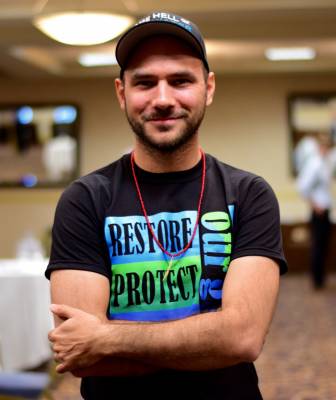
Ramsey Sprague, Mobile Environmental Justice Action Coalition
I grew up in Arlington, Texas and I grew up downwind from a hazardous waste incinerator that was used as a cement kiln that was burning petrochemical waste from the gulf as its fuel source. I grew up with constant nosebleeds, with severe allergies, asthma. I had respiratory infections that would leave me debilitated for two weeks of the year annually, that was my state.
As a child I never questioned it. I never thought there was something fundamentally wrong with me, or something wrong with the air I breathe. It’s simply how it was, right?
Coming into adulthood I learned about that toxic waste incinerator and became involved with a local advocacy group that worked to shut down that cement kiln after 20 years of operating in that way. When you come to this type of environmental justice work you see that there’s incredible amounts of data out there that describe your condition, and yet you’ve never seen it. You’re never told how to interpret it, other than the industry line, which is “it’s fine — don’t ask questions, don’t worry yourselves because we’ll take care of it if there’s a problem.”
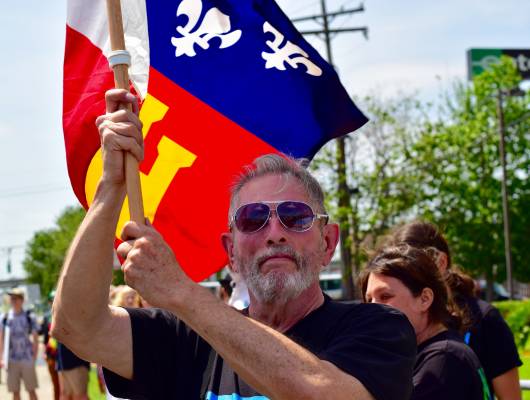
Robert Desmarais Sullivan, First Unitarian Universalist Church of New Orleans
I saw a young man about 20-years old have a seizure in front of me because he went swimming in the Gulf. And then I realized something is wrong. We’re doing everything in the world to protect the oil companies and nothing to protect the people.
That flag you see me with, that is actually the Cajun flag. Where I come from the people were fishermen, but then they got offered more money to work in the petrochemical industry so they gave up the fishing and the shrimping except for weekends. What they were producing ended up poisoning them.
I’ve seen them give up everything they thought of as Cajun and French to fit into this oil industry expectation. I do hold the oil industry partly responsible for the decline of the way of life of the people in my community. My community in Cameron Parish — not directly because of the oil industry, but indirectly because of climate change — doesn’t exist anymore.
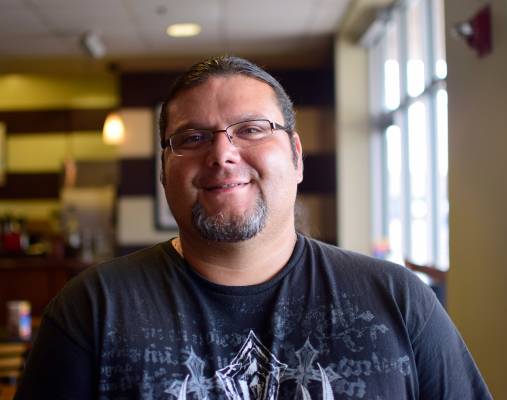
Donny Verdin, Tribal Councilman United Houma Nation, Lafourche Parish
People of our communities were traditionally fisherman. When the oil industry came in we lost a lot of rights to areas to go fishing. They put canals up, they put gates up, they put dams up. It was an easy transition for them — well, we already knew how to run boats — so we’d run boats for the oil and gas industry.
I think the key is to find a transition from the oil industry back into something else in our communities, but it’s hard to do because our fisheries are ruined and the only other industries around are tied to the oil industry.
My hope is that my children will have clean water to fish in. Their ground won’t be poisoned so they can grow food. They’ll have traditional lands to hunt and can trap in. We’re losing a lot of traditional lands because we’re not a federally recognized tribe, we can’t lay claim to land. The privatization of land is spreading at a rapid rate here, so places I used to hunt and trap and fish when I was younger are sold off and there’s a fence there now.
I believe one of the major reasons we’re not federally recognized is because most of the land that our communities are on or were on are very rich in oil and gas, there are drilling operations going on, so I believe their lobbyists are blocking our recognition.
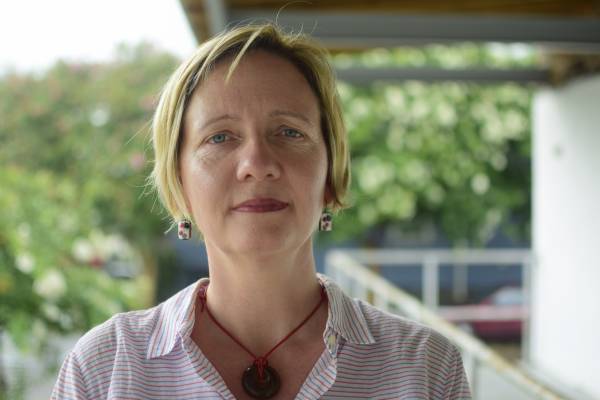
Anne Rolfes, Louisiana Bucket Brigade
In Baton Rouge, our state capital, there’s a neighborhood right across the street from ExxonMobil. ExxonMobil makes 40 billion dollars year after year, and this neighborhood has over 40% child poverty. It’s right across the street from Exxon. There is no clearer case than that of the abuse and inequity in this industry.
You always see a lot of auto immune illnesses in the neighborhoods. They’re usually African American communities. The state typically blames the communities. In Baton Rouge or in Norco or in St. Rose when people complain about the high rate of cancer or auto-immune diseases, the response will be — truly it is: ‘You eat too much fried chicken. It’s your fault because of your diet.’ And it’s just a ridiculous statement when people are living across the street from these enormous facilities that pump out carcinogens and all sorts of horrible chemicals.
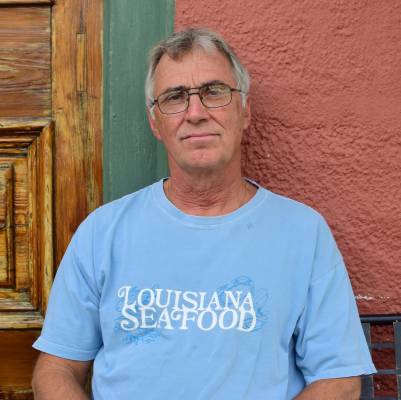
George Barisich, Commercial Shrimper, St. Bernard Parish
Can you describe in detail the respiratory issues you have after the BP Oil Spill?
I start shrimping in May, I shrimp all the way to Christmas, then I switch the boat over and catch oysters all the way to May. I’ve been doing it all my life. I’m still in good shape, but I’d be much better off if I could breathe.
There’s thousands of people who are sick. I’m minimally sick compared to some of these people. I can still work. Some people can’t. Young kids, 30, with kids, sick.
For me, it limits my ability to work hard. I can still work, but I gotta have an extra deck hand. Shoveling real quick and fast, that’s out of the question — and I did that without breaking a sweat before. I got fat. I got up to 205 pounds cause I couldn’t work. Now I’m just a hot blooded Croatian who can’t breathe anymore.
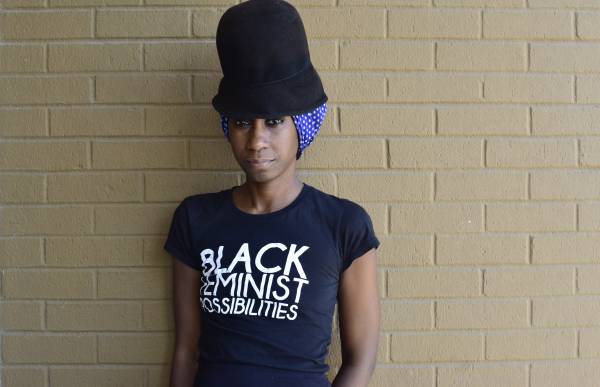
Shana griffin, mother, feminist, activist, and independent researcher
Why were communities of color or low -income communities hit harder by Katrina? It’s not like Katrina was racist. The surge of the water flowed through already pre-existing forms of racialized and spatial segregation patterns. That’s why certain communities were hit harder than others. The impact overall tells an interesting story, but then our response to it ignores all those things. We continue to talk about the climate impacts of sea level rise, intensifying droughts, green house gas emissions, stronger hurricanes, and more severe weather conditions—but questions remain: What are the social and economic impacts of these conditions? How are they impacting marginalized communities? And what principles are informing our strategies to combat these challenges?
If disaster strikes again, one of the things that Katrina has taught us is that low-income communities and people of color are going to be targeted and criminalized and blamed. They’re going to be called looters, there’s going to be a police state that shows up to force people out of the city, we know those things are going to happen. So you have people right now organizing to reduce the jail size, to stop criminalization, but they don’t see how that’s connected to climate.
In my humble opinion, the Gulf Coast region should be leading the climate justice movement in this country, period. And the question is why are we not? The resources are not there to support the work because places like the Bay Area, the Appalachia area, and the southwest gets a lot of funding but this region specifically doesn’t.
The Gulf Coast receives less than 1% of all environmental grant awards, yet the region includes thousands — I mean thousands — of drilling platforms on and offshore, pipelines and petrochemical plants, half of the country’s refining capacity, the largest concentration of oil seaport and import sites, and is now one of the preferred sites for extreme energy extraction. We are basically the bedrock of the U.S.’s fossil fuel industry without any strong support to counter this narrative. There’s an unwillingness to truly engage the communities whose livelihoods have been entrapped by fossil fuel dependency. To engage them in re-imagining alternative economies and acknowledging the challenges and contradictions they face. The solutions are here.
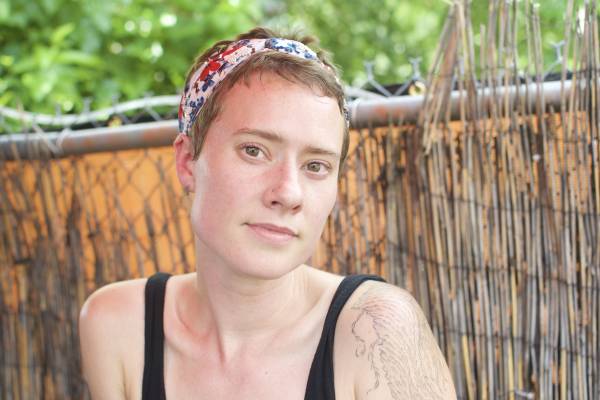
Alicia Cooke, 350 Louisiana
I’m not from here. I’m white. I have a certain amount of privilege and I have a certain amount of income. I’m going to be able to go through my whole life not really feeling this. I might have to move further inland. I might have to pay through the nose for my air conditioning bills but it’s not going to break me. I’m going to be able to weather that. If that’s true for me, that’s definitely true for oil and gas executives or climate denying politicians who live in these gated communities in our suburbs who I think can go the rest of their lives completely denying that there’s a problem that they’ve helped create. Some people are always going to have enough money to weather the storm, and if they don’t want to look at the problem, they don’t have to.
- See “Losing Ground: Southeast Louisiana is Disappearing Quickly,” Scientific American.